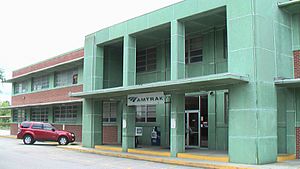North Charleston station facts for kids
Quick facts for kids
North Charleston
Intermodal Transportation Center |
||||||||||||||||||||
|---|---|---|---|---|---|---|---|---|---|---|---|---|---|---|---|---|---|---|---|---|
| Amtrak inter-city rail station | ||||||||||||||||||||
| Location | 4565 Gaynor Avenue North Charleston, South Carolina United States |
|||||||||||||||||||
| Coordinates | 32°52′29″N 79°59′53″W / 32.87472°N 79.99806°W | |||||||||||||||||||
| Owned by | City of North Charleston | |||||||||||||||||||
| Line(s) | Charleston Subdivision | |||||||||||||||||||
| Platforms | 1 side platform | |||||||||||||||||||
| Tracks | 2 | |||||||||||||||||||
| Bus stands | 2 | |||||||||||||||||||
| Bus operators | ||||||||||||||||||||
| Construction | ||||||||||||||||||||
| Structure type | At-grade | |||||||||||||||||||
| Architect | Davis & Floyd, Inc. | |||||||||||||||||||
| Other information | ||||||||||||||||||||
| Station code | Amtrak: CHS | |||||||||||||||||||
| History | ||||||||||||||||||||
| Opened | December 13, 2018 | |||||||||||||||||||
| Traffic | ||||||||||||||||||||
| Passengers (FY2019) | (Amtrak) | |||||||||||||||||||
| Services | ||||||||||||||||||||
|
||||||||||||||||||||
|
||||||||||||||||||||
The North Charleston Intermodal Transportation Center is a special kind of station in North Charleston, South Carolina. It's called "intermodal" because it connects different ways to travel. Here, you can catch Amtrak trains and also local and regional buses. It's the main train station for the Greater Charleston area. You can find it at 4565 Gaynor Avenue.
Station History
The idea for this station started way back in 1996. People wanted to build a central place for trains and buses. They picked a large area on West Montague Avenue. For many years, they studied the land and bought what they needed.
In 2009, a company called Davis & Floyd, Inc. joined the project. They designed a large, two-story building. It was planned to look like an old train station from Charleston that was built in 1907. The building was meant to have offices, shops, and spaces for Amtrak and bus services.
However, in 2012, there was a problem. The chosen spot was too close to a busy freight train yard. Building the station there would have cost too much money. So, the project had to stop.
In 2014, the team decided to move the station to a new location. This new spot was on Gaynor Avenue, right next to the old Amtrak station. They had to do new studies and get new permits.
In 2015, the city of North Charleston took over the project. To save money, they made the building smaller. They removed plans for shops and some offices. On December 13, 2018, the North Charleston Intermodal Transportation Center officially opened!
In 2019, they started the second part of the project. This included taking down the old train station and finishing the rest of the new station's platform and parking areas.
The Old Train Station
The old train station, called the Atlantic Coast Line (ACL) depot, opened in 1956. It had a cool, modern design for its time. It featured clean lines, a flat roof, and big windows. The building used red brick and green concrete panels. Inside, it had tough materials like brick and green flooring that could handle lots of people.
When it was built, laws in the United States separated people by race. Because of this, the station had two different waiting areas. Each area had its own restrooms. One area was for white passengers, and the other was for black passengers.
In 1971, Amtrak took over passenger train services. The old station continued to be used until December 13, 2018. That's when all train services moved to the new North Charleston Intermodal Transportation Center.
Because the old station was important to history, the city made an agreement. They promised to create detailed drawings and photos of the old building. They also planned to save one of its green tiles. These items will be displayed in the new station's museum. This helps remember the station's past.
Train Services
The North Charleston station serves two Amtrak train routes. This means there are four trains stopping here every day.
- The Palmetto is a daytime train. It travels north at 10:00 AM and south at 7:19 PM.
- The Silver Meteor is an overnight train. It travels north at 9:17 PM and south at 4:51 AM.
Amtrak's ticket counter and baggage services are open at specific times. They are open from 4:00 AM to 11:45 AM and again from 4:00 PM to 11:45 PM.
On Amtrak's schedules, this station is simply called Charleston.
Station Layout
The new station is almost 15,000-square-foot (1,400 m2) in size. It's a single-story building made of brown brick and textured concrete. It has tall, flat columns that break up its long walls. One end of the building has a tower. The main entrance has a special triangular shape and a clock.
Outside, there are canopies to protect travelers from bad weather. These covers are for people arriving by car, bus, or train. The roof is steep and has windows that let natural light into the building.
Inside, the station has different areas. There's an entry area, an Amtrak area, and a main passenger area. This central area connects the CARTA and Southeastern Stages bus sections. The floor has a cool pattern of light and dark gray diamonds. The station is fully accessible for people with disabilities. It also has extra meeting space and a museum about the Liberty Hill neighborhood.


